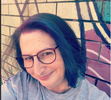Samantha Bryant's Blog, page 17
November 27, 2022
Imaginary landscapes for my imaginary friends: An Open Book blog hop post
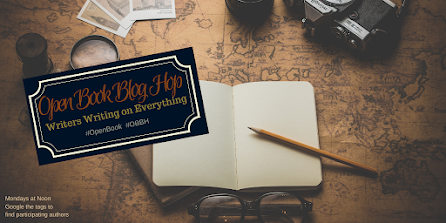
Welcome to Open Book Blog Hop. You can find us every Monday talking about the writing life. I hope you'll check out all the posts: you'll find the links at the bottom of this post.
Nov 28, 2022 Do you use real or fictional cities in your writing? How do you incorporate them into the story?
My Menopausal Superhero series takes place in an imaginary southern city, sort of an amalgam of several cities in the region. I made the decision not to use one particular real city because I didn't want to be limited by reality in that sense, or stuck researching things I don't know about a city.
So, I invented Springfield and have avoided saying which state its in, though careful readers could see that must be somewhere around North Carolina, South Carolina, or Virginia because of the travel times to other real places that are mentioned in the series.
I named it Springfield because I was after that "this could be anywhere" kind of feeling--there's a Springfield in 34 of the United States, and 58 of them worldwide. Most ensemble superhero stories seem to center around a particular city, and I wanted to have that same feeling, but set it someplace smaller than a New York City analogue like Gotham or Metropolis.
I used a similar strategy for naming each of the Menopausal Superheroes. I decided what year she was born and looked up most popular baby names for that year.
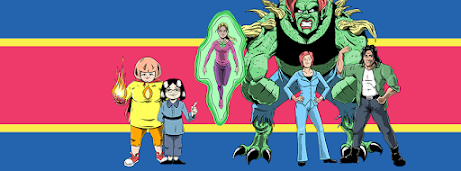
So, Patricia "Lizard Woman" O'Neill was born in 1955. Helen "Flamethrower" Braeburn was born in 1950.Dr. Cindy Liu was born in 1946. Linda (later Leonel) "Fuerte" Alvarez was born in 1965. Jessica "Flygirl" Roark was born in 1980 (she went through menopause early, as a cancer survivor).
All their very common names are intended to give an "everywoman" feeling to the characters. All the heroes had in common that lived in Springfield, which put them in contact with Dr. Liu--the mad scientist who started it all.
Springfield is a medium-sized city, big enough to have urban parks and urban crime. Museums, theater, restaurants, and local monuments, but not likely to have a large tourist trade. Probably Springfield didn't make the news much until some of her citizens developed unusual abilities.
So, that's my imaginary city. Do you like writing and reading stories that take place in real places? Or do enjoy made up places? Or like me, maybe you love both! I'd love to hear your thoughts in the comments.
You are invited to the Inlinkz link party!
Click here to enterNovember 25, 2022
My reading life since July
I started a new job in May. Not just a new job, a complete change in career, moving from classroom teaching to working mostly from home as a content strategist for a big financial company.
Of course, that set everything else in my life topsy-turvy, too--from what time I get up in the morning, to when I do my creative writing, to what I eat for lunch, when and how I exercise, and of course, how much and what I read.
Looks like I haven't written about my reading life since June! Unusual for me--since I usually do a monthly round-up of what I've been reading.
As of today, I'm 2 books behind on my reading challenge (I always make a goal of 52 books a year, one per week). Not too bad considering all the changes in my life.
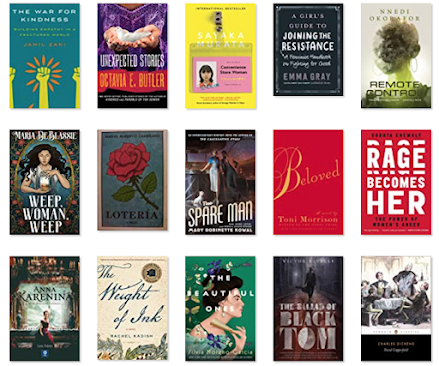 Screenshot from my Goodreads Reading Challenge 2022
Screenshot from my Goodreads Reading Challenge 2022I'm still reading primarily on audiobook (either on Audible or Chirp), on Kindle, or on audiobook with reference to the ebook edition, depending on whether I expect to want to take notes. Paper books continue to be difficult for me because of arthritis and eyesight. Another reason to love being a 21st century girl--my limitations don't have to constrain my reading.
For a little while there, I was reading GIANT books. Partly, this is the fault of my First Monday Classics Book Club, which chose David Copperfield for August and Anna Karenina for October. We tend to do that--if the first Monday is a holiday, we don't meet that month, so this year we didn't meet on Independence Day or Labor Day. When we've got 2 months between meetings, we pick a tome. Each of these took me fully a month to read.
Between those two tomes, I read one short one (The Ballad of Black Tom by Victor LaValle), one medium one (The Beautiful Ones by Silvia Moreno Garcia), and yet another tome ( The Weight of Ink by Rachel Kadish).
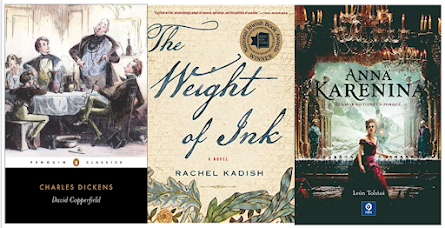
Those three tomes were probably why my book count fell behind, but I'm really glad I read all three of them. The Weight of Ink was a work of historical fiction that pulled me into a world I had never really read about before, the immigration of Jews from Portugal to Amsterdam to London during the Inquisition, with fascinating main characters in both the past and present storylines. David Copperfield was a sweeping story of growing up poor and making something of one's self and Anna Karenina was a sweeping story of growing up rich and losing it all--proof that getting what you want isn't the same thing and finding happiness.
The Ballad of Black Tom had been on my TBR for quite some time, having come highly recommended by several friends who also enjoy horror and dark fiction with a Lovecraftian bent. It was excellent. And I picked up The Beautiful Ones because I LOVED Mexican Gothic by the same author. It proved similarly atmospheric and lyrical, so I'll definitely be seeking out more by Silvia Garcia Moreno.
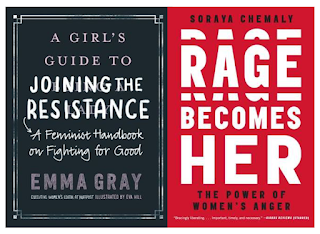
I read more nonfiction than usual this fall. My daughter had read Rage Becomes Her by Soroya Chemaly as part of a summer course, and recommended it. Reading it led me to A Girl's Guide to Joining the Resistanc e by Emma Rose Gray. Both books speak to the rage that has taken over a lot of women in the past decade or so, as certain elements of our society have worked to squash the gains we have seen in civil and legal rights since my grandmother's day. If you're looking to channel the energy of your anger in helpful directions, you can find some ideas in these two books.
Also in nonfiction, I read The War for Kindness by Jamil Zaki. It's part of work-related book club I'm participating in (I know; I have a book club problem--I just love the experience of talking about books with other people who've read the same books SO MUCH). I also started Atomic Habits and plan to pick up How to Make Sense of Any Mess: Information Architecture for Everyone and expect to finish those before the year ends. All three of these are part of my attempt to connect with my new colleagues and understand corporate thinking. Even if I find some of the thinking simplistic, I do find that they spark good conversations.
I think I'm a hard sell when it comes to "self help" and related genres--my skepticism is sparked when the solutions are too easy, and I'm over fifty--so some of the ideas are old hat for me. Hardly as eye-opening as they think they are.
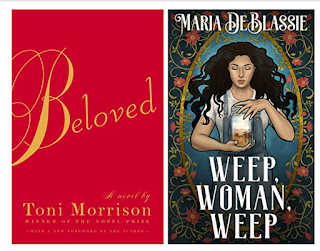
Beloved by Toni Morrison was the November choice for First Monday Classics, which meant I was reading it in October. Very thematic. This was my third or fourth time reading the book and it's still harrowing. Truly one of the best ghost stories I've ever read. It was made even better this time as my audiobook was read by Morrison herself.
I also picked Weep, Woman, Weep by Maria DeBlassie as a bit of seasonal reading for my neighborhood book club. It plays in the mythology of La Llorona, and I'd been interested in it since last fall when I participated in a reading for Strong Women, Strange Worlds with the author.
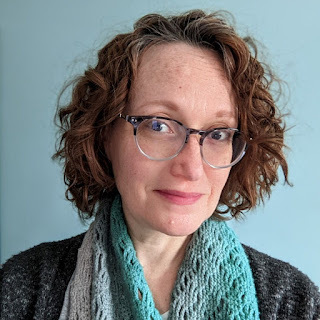 I also was a guest at Multiverse in Atlanta, Georgia this October--with guest of honor Mary Robinette Kowal.
I also was a guest at Multiverse in Atlanta, Georgia this October--with guest of honor Mary Robinette Kowal. I was already an admirer of Kowal's Lady Astronaut books (The Calculating Stars , The Fated Sky , and The Relentless Moon ). I was thrilled to get to meet her and participate in her Q&A (she talked about how her puppetry work feeds her writing and that was fascinating!).
She described her newest release, The Spare Ma n, as "the Thin Man in space" and I was sold since I adore Nick and Nora Charles.
I bought it before I left the con and started listening to it on the way home. Kowal also narrates her own work, and does beautiful voicework, so it was a real treat.
Right as I finished that book was when I realized that I was behind on my reading challenge and started choosing short works that were already in my Audible library. So in short order (roughly one book per day), I read: Lotería by Mario Alberto Zambrano Remote Control by Nnedi Okorafor Convenience Store Woman by Sayaka Murata Unexpected Stories by Octavia ButlerAll of them were well worth reading and left me thinking in different ways. I probably enjoyed Remote Control the most, and will probably spend the most time pondering Convenience Store Woman.
So, that's where my reading time has gone since summer. How about yours? Anything I should add to my endless TBR? I'd love to hear about it in the comments!
November 20, 2022
Cats and Dogs and other unexpectedly contentious things: An Open Book blog hop post
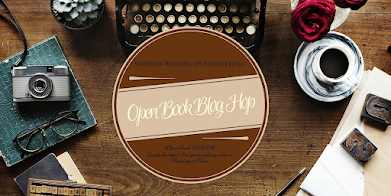
Welcome to Open Book Blog Hop. You can find us every Monday talking about the writing life. I hope you'll check out all the posts: you'll find the links at the bottom of this post.
Nov 21, 2022 Big internet fight: Are you team cat or team dog? (or something else?)People do like to squabble about silly things sometimes, don't they? I don't really have a side in this one, though. Currently, the non-human animals in my house include one snake and two dogs. But over the years, I have shared my home and my heart with a rabbit, four other dogs, some frogs, a hermit crab, a bunch of fish, and five cats (not all at the same time). I'm a grand-mum to my daughter's two cats. They've all had their good and bad qualities.
I might lean slightly more toward dog-person than cat-person, but I think I would have both if they could get along together. No cats in my immediate future though, as the husband is allergic, and I like him more than I like cats. I'd love some more reptiles, and a goat if I had the yard for it. We'll see what the future holds.
All in all, I feel pretty fortunate to have had animal love in my life. Pets have seen me through a lot of sadness and loneliness and brought even more joy to happy times in my life. They are better companions than many humans.
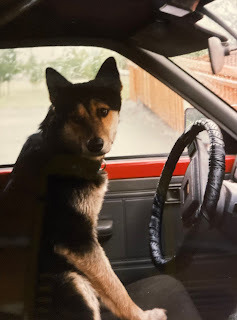
I'll finish with a poem I wrote for the first dog I adopted in my adult life: Häagendog.
A Woman Needs a Dog
A woman needs a dog
at times like these,
when she has watched too many sunsets alone
and, waking to an empty pillow
in the middle of the night,
cried.
Dogs understand
the desperation we all have
to be loved, how the need of love
can make you abase yourself
and be glad of the opportunity.
A dog knows how oppressive
it can be to be alone,
yet how important it is
to be independent and strong.
They appreciate that there is a time
to play in the sun,
a time to sing to the moon,
and a time to rest your paws
on silken pillows
and wait. They know
the beauty of indolence,
and the joy of comfort in their own skins.
And a woman with a dog
is never alone and never unloved.
Do you have a strong opinion about cats vs. dogs? Or just want to tell me about animals you've loved? I'd love to hear about it in the comments!
You are invited to the Inlinkz link party!
Click here to enterNovember 13, 2022
Dealing with feedback: An Open Book blog hop post
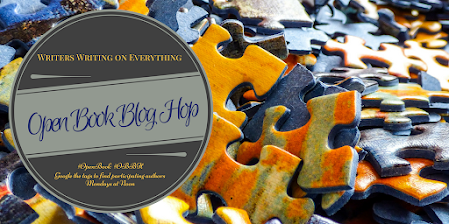
Welcome to Open Book Blog Hop. You can find us every Monday talking about the writing life. I hope you'll check out all the posts: you'll find the links at the bottom of this post.
Nov 14, 2022 How do you deal with negative feedback? Do you have tips for critiquing other writers’ work?
I value feedback on my work.
I'm a part of two regular critique groups--one in person and one online--because having other eyes on my work is so helpful to solving the puzzle. I learn a lot, too, from providing feedback. Having to examine my own reactions and be specific about where I got lost or why a scene isn't working for me helps me avoid falling into those same pitfalls when it's my turn.
That's feedback in a safe environment, though, with people I have long-term relationships with and where reciprocity necessitates kindness, or at least professionalism.
There's also public feedback, in the form of reviews or social media comments. That's a completely different kettle of fish, and sometimes it really stinks.
 image source
image sourceI accepted long ago that my work isn't for everyone, but a lot of reviewers and commenters do seem to forget there's a person on the other end of that work. They can be belittling or accusatory in their critiques, so it's important to develop a thick skin and learn to sort the wheat from the chaff.
There's a balance to be found, as there is in so many things, both in receiving and giving criticism.
 image source
image sourceWhen receiving it, I try to listen without pushback or oversensitivity, to allow for the possibility that the complaints are at least partly legitimate. This is easy with my critique partners, because we have long-established relationships, but hard with random members of the public, when it can feel like an attack, especially if you run across the comment unexpectedly.
That's why I only wade in and read reviews periodically, and never if I'm already in the throes of self-doubt and low confidence. I do still read them though. I know some authors don't, but I watch for themes, so I can learn and make each book better than the one before it.
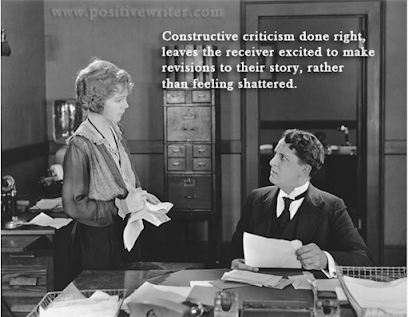 image source
image sourceWhen I'm the one giving critique, I make sure I come with a heart to help. I think about how I would want to hear a critique and try to give my fellow writers the same consideration. Whether I'm writing a review or offering feedback in a writing group, I try to be fair and balanced, explaining any biases I have that color my view and pointing out what is done well as well as what didn't work for me.
How do you handle giving and receiving critique in your life? What makes it easy or hard? I'd love to hear your thoughts in the comments! Check out the rest of the blog hop in the link below.
You are invited to the Inlinkz link party!
Click here to enterNovember 6, 2022
When Characters Text: An Open Book Blog Hop post
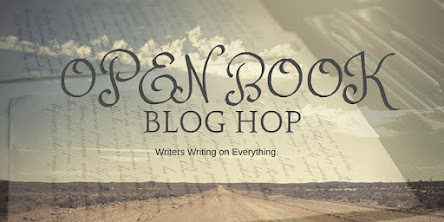
Welcome to Open Book Blog Hop. You can find us every Monday talking about the writing life. I hope you'll check out all the posts: you'll find the links at the bottom of this post.
Today's question: Nov 7, 2022 There don’t seem to be any universal rules for indicating texting in books and short stories. How do you handle it?
Texting hasn't really come up in my books that much so far, though I've seen it in other books, where entire pages of dialogue represent a text conversation.
In my Menopausal Superheroes series, I've mentioned that texting is happening, but summarized the conversation rather than quoting it. I've used ordinary dialogue conventions for the few bits I've quoted fully, like so:
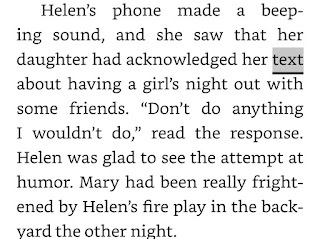 From Going Through the Change, book 1
From Going Through the Change, book 1It's an interesting question. I've seen books that present it in imagery, so that the page actually looks like texting screen, like these superhero group chat memes (I love these things).
It could get confusing though, if the formatting got jumbled when you moved from reading on paper to reading on a digital device or something, and I'm not sure how that would work at all in an audiobook.
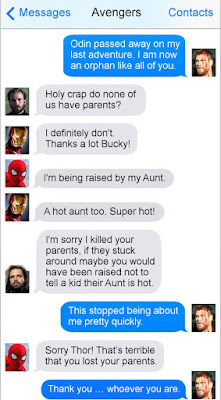 image source
image sourceBut if it's just a few quotes, I think I'd still just write it out using ordinary dialogue conventions, but add something in the sentence to indicate that it's a text. Texting is definitely one of the most popular ways that people communicate here in the twenty-first century, so I'm sure some kind of standard will eventually be settled on to represent those conversations in books.
Jane Austen never had to think about things like this!
Do you have any opinions about how texting should be represented in books? I'd love to hear your thoughts in the comments below. And don't forget to check out the other posts from my fine colleagues at Open Book via the link.
You are invited to the Inlinkz link party!
Click here to enterNovember 2, 2022
What's so great about NaNoWriMo anyway?
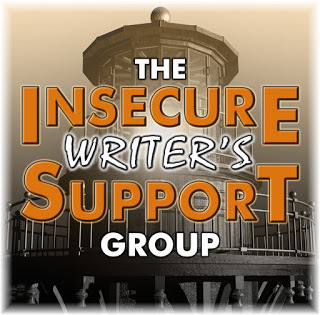
Welcome to the first Wednesday of the month. You know what that means! It's time to let our insecurities hang out. Yep, it's the Insecure Writer's Support Group blog hop. If you're a writer at any stage of career, I highly recommend this blog hop as a way to connect with other writers for support, sympathy, ideas, and networking. If you're a reader, it's a great way to peek behind the curtain of a writing life.
Our Twitter handle is @TheIWSG and hashtag is #IWSG. This month's co-hosts are: Diedre Knight, Douglas Thomas Greening, Nick Wilford, and Diane Burton!
November 2's optional question - November is National Novel Writing Month. Have you ever participated? If not, why not?
__________________________________________
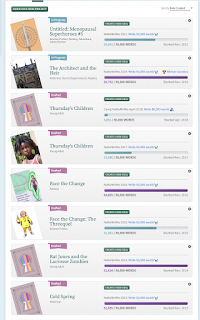
NaNoWriMo has been helping me since 2013. I'm an eight time player, and four time winner. One of the books I wrote for NaNoWriMo is now a published novel--the third in the Menopausal Superhero series.
I've written about it before on this blog:Why I NaNoWriMo, November 2019On Being Okay with Not Making It: My NaNoWriMo Failure, November 2017NaNoWriMo and Me, November 2017On Not Winning, December 2015Of Turkeys and Word Counts, November 2015The Valley After NaNoWriMo, December 2014NaNoWriMo 2014: Week Two, November 2014Post NoNo Blues: PPD for Writers, December 2014NaNoWriMo 2013: I Won!, November 2013
I last participated in 2021, working on the novel that I'm still working on now. I'm strongly considering participating (it's still October as I write this--I have a few more days to decide) this year again to give myself some pressure and impetus to finish a draft.
What I love about NaNoWriMo is the sense of accountability and community. Sometimes I need a little outside pressure, a feeling that someone is watching and I need to make a good showing.
No one has ever been mean about it when I didn't make my goal--that's not the vibe of the event at all. I even threw my hat in some years in the full knowledge that it was impossible that year, where my secret goal was just more words than I would have written otherwise, maybe 30K when I'd been averaging 20K a month for a while.
It helps me stop overthinking, because I have to work fast to make that word count. There isn't time to dither too long over details that maybe won't even matter in the final draft.
It helps me carve out the time from all my other responsibilities and to make sure my novel takes the priority in my limited writing time each day--protecting it from marketing and social media work, for example.
If I'm participating in a challenge that I know is short term, there's a sharpness of focus and purpose that comes. I feel less guilty about the stuff I'm NOT doing so I can do NaNoWriMo, precisely because it is "only for a month."
How about you writer friends? Do you NaNoWriMo? And reader friends, do you have challenges you participate in to boost your productivity or give focus to something you love? I'd love to hear about it all in the comments.
October 30, 2022
Podcasts: an Open Book blog post
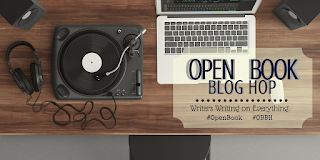
Welcome to Open Book Blog Hop. You can find us every Monday talking about the writing life. I hope you'll check out all the posts: you'll find the links at the bottom of this post.
Today's question: Do you do podcasts? Either as the host or as a guest? How do you prepare for them?
Podcasts are something I wish I had more time for, both as a consumer, a guest, and a potential creator. But there are only so many hours in the day!
I seem to do more video shows, which one could argue are just another form of podcast. For example, here's a panel discussion I participated in recently with B Cubed Press, the press that published my most recent short story "No Country for Young Women" in Post-Roe Alternatives: Fighting Back.
And here's one from this spring on Women in Horror.
So far as audio-only programs, I've had a few guest spots. I like audio podcasts a little better than video appearances, if only because I don't have to think about what I look like and worry about whether I'm making a derp face.
Here's my appearance on "There's stories everywhere":
and another on Women's Writes.
Podcasts are also publication opportunities these days. I've started to submit my work for audio publication. My short story "Poison" was featured on Manawaker Studio's Flash Fiction podcast:
And "Moondance" was on Night's End.
I really enjoy these opportunities. It really makes me feel like I'm in the future to be able to talk writing with people around the world without leaving my house.
A lot of podcast and interview shows are spontaneous, so I don't necessarily do much in the way of preparation. After years as a teacher, I'm comfortable with speaking "on my feet" without knowing too much about's coming in advance. Of course, if I'm given a list of questions or a topic, I make some notes to make sure I don't fall into a long um………… while I try to remember the name of the book I wanted to cite or something like that.
Sometimes, if there's a reading involved, I'll practice, both to make sure that my selection fits the time limits and that I can read it aloud smoothly.
So far, I haven't done my own podcast, but I could totally see myself doing that in the future. Maybe when I get rich and famous and quit the day job (or more likely, after I retire). I do have a YouTube channel, where I put up video readings, poetry appreciation, and writing life talks from time to time.
How about you? Do you listen to, record, or participate in podcasts?
You are invited to the Inlinkz link party!
Click here to enterOctober 23, 2022
What would you study? An Open Book blog post
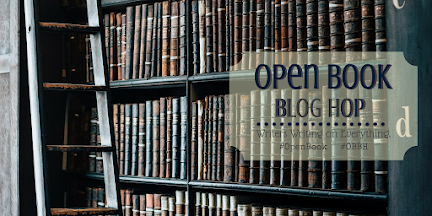
Welcome to Open Book Blog Hop. You can find us every Monday talking about the writing life. I hope you'll check out all the posts: you'll find the links at the bottom of this post.
Today's question: If you could take a free class at a university, what course would you take?
I've had some great learning partners in the form of teachers in my life, and a great teacher has definitely made all the difference for me when I was studying something I found intellectually challenging, like when I took Transformational Grammar with Thom Stroik. He was so passionate about linguistics and it was hard to sit in his classroom and not become infected with that same enthusiasm.
I'm not as interested in formal learning on someone else's schedule as I used to be, though. As much as I've loved school, there's something to be said for auto-didacticism: building my own reading lists and choosing assignments that push me in the direction I wanted to go and are tailored to my own specific interests and strengths.
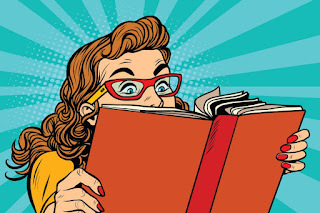 image source
image sourceThere's any number of things I'd like to study: additional languages, various eras and segments of literature, sociology, feminist theory, agriculture, business management, webpage design, anthropology, geography…pick. your "logy" or "aphy" and I could probably summon some interest. It all serves as fodder for my writing life, after all. And I'm at least a little interested in almost everything!
So, since I'm good at finding resources and teaching myself in a lot of ways, for me, it's not "what" I'd like to study, but "who" I'd like to study with.
If I had the chance to study writing with Neil Gaiman, I'd pounce on it. I've almost bought his online master class more than once, but am not entirely convinced that it would worth it, without the personal interaction. Relationships are a big part of learning. Joyce Carol Oates is at Princeton. That would have to be worth the trip.
Let's see, who else? I hear that Condoleeza Rice is teaching Political Science at Stanford. That would have to be fascinating. Or how about Andrew Ng teaching Computer Science, also at Stanford? Or a film class with Spike Lee at New York University? University of North Carolina at Chapel Hill recently lost the chance to have Nikole Hannah-Jones on staff through shenanigans, so I'd need to follow her to Howard University.
How about you? Is there someone you're yearning to study with, or a topic you'd devote study to, given the time and resources? I'd love to hear about it in the comments! And don't forget to check out the other posts in the blog hop, by my fine colleagues of Open Book.
You are invited to the Inlinkz link party!
Click here to enterOctober 16, 2022
Marketing for Introverts: An OpenBook blog post
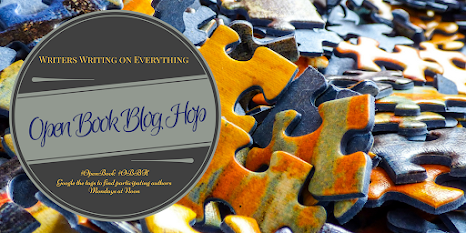
Welcome to Open Book Blog Hop. You can find us every Monday talking about the writing life. I hope you'll check out all the posts: you'll find the links at the bottom of this post.
Today's question: Most of us (or maybe all of us) struggle with marketing. What are your top 3 marketing tips?
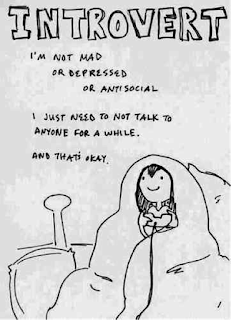 Hi! I'm Samantha, and I'm an introvert. In fact, I'm really happy that we're having this little talk here on the Internet, where I don't have to actually talk to you.
Hi! I'm Samantha, and I'm an introvert. In fact, I'm really happy that we're having this little talk here on the Internet, where I don't have to actually talk to you.It's not that I'm not friendly. I bet I'd even like you. It's that I'm still recuperating after participating in a fan convention this weekend for my writing life.
Being a writer might seem like a natural job choice for an introvert. In some ways, it's an excellent fit.
Doing the work requires spending copious amounts of time alone.
The work itself is usually pretty quiet (just some keyboard clicking or pen scritching noises).
You can do the work wherever you are most comfortable.
On the other hand, if you want to make a career of writing, you can't *just* write. You have to put your work out there for others to read.
Then, there's the marketing, that second job of garnering attention for your work and being discoverable. That can be pretty painful for a introverted person, but I'm here to tell you that it can be done. You can make a career as a writer without undergoing some kind of alchemy and becoming an extrovert, and in some ways, introverts might be especially well suited to it.
So, here are a few things to consider if you're an introvert and trying to promote yourself and your work.
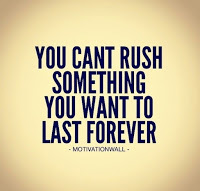 1. Take it slow: A lot of people seem to think that building a writing career and support network is a sudden quick movement, like sweeping the legs in a kickboxing match.
1. Take it slow: A lot of people seem to think that building a writing career and support network is a sudden quick movement, like sweeping the legs in a kickboxing match.It's not.
Not even for extroverts.
Building contacts and relationships is the work of years, and luckily, it's the kind of work introverts are good at! We may not be comfortable standing behind the megaphone and calling for the attention of everyone in the room, but we're great one-on-one and when we get to know someone, we usually get to know them well. Our relationships are deep and strong and lasting.
When you are meeting new people, be reasonable in your expectations for yourself. I'm happy if I make one or two new initial contacts at any given event. I'm not trying to go home with my pockets bursting with business cards. I'm trying to make a few meaningful connections.
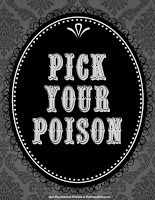 2. Pick your poison: There are a lot of ways to put yourself out there as a writer. You can give readings, participate in discussion panels, teach workshops or classes, hand sell books from a table or booth at an event, make videos about your work, tweet cleverly, blog, etc.
2. Pick your poison: There are a lot of ways to put yourself out there as a writer. You can give readings, participate in discussion panels, teach workshops or classes, hand sell books from a table or booth at an event, make videos about your work, tweet cleverly, blog, etc.Some of these things will scare the heck out of you, and some may only make you nervous. Pick something you feel like you can do and try it. You can push yourself a little at a time, and you don't have to put yourself out there on every possible platform.
Look at events carefully, think about your comfort levels, and plan accordingly. I enjoy doing fan conventions, for example, but I tend to stick to small and medium sized ones relatively near my home base.
I take my sister with me whenever I can because it's good to have someone more outgoing with you and someone who will help you take care of yourself when you need it. Even better if that someone loves you and understands your needs and limits.
I like panel discussions because they have a clear structure and don't require me to "make the first move" like approaching someone at a booth or table does. Someone will call on me when it's my turn to talk.
I ask convention organizers not to schedule me for late night programming because it's harder for me to be entertaining and clever and "on" when I get tired.
Over time, this has gotten more comfortable for me because I've gotten to know more and more people, so often attending an event means I'll be among as many friends as strangers. I find that VERY comforting.
Though Dragon Con is the BIG con near me, I have yet to apply, because I know how stressful I would find it to navigate the halls of such a large free-for-all event. Maybe I'll get there someday, or maybe I won't. We'll see.
For now, I'm feeling good about how much more comfortable I feel with what I'm doing now.
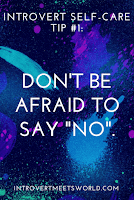 3. Self-Care! Everyone needs self care, but introverts may need to tend to themselves a little sooner and more specifically than other folks (I wouldn't know; I've never been one of those other folks).
3. Self-Care! Everyone needs self care, but introverts may need to tend to themselves a little sooner and more specifically than other folks (I wouldn't know; I've never been one of those other folks).For me, that means being as careful as I can be with my schedule: making sure there are adequate meal breaks and quiet time, packing some good snacks.
That might mean that I skip some networking opportunities and don't go to the bar with the other writers after an event, or decide to spend time alone in my hotel room instead of sitting at my table or booth for two more hours (even if I miss a chance to sell a book that way).
If I don't give myself space to recoup my energies, I'm not going to make a good impression or make good use of those opportunities anyway.
It also means that I try to give myself decompress time after an event.
I'm writing this on Monday and I got home from a convention on Sunday night. I had three different social invitations today, but I turned them all down in favor of sitting here quietly at my laptop. It was the right choice, especially since I'll have to be "on" again next weekend for another event.
So there are my thoughts on how to make a go of this if you're an introvert. I'd love to hear your thoughts in the comments!
You are invited to the Inlinkz link party!
Click here to enterOctober 9, 2022
Pizza, Anyone? An Open Book blog post
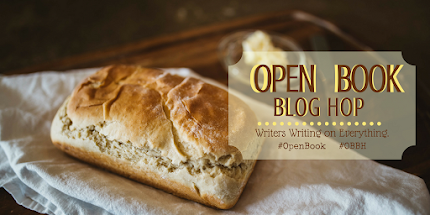
Welcome to Open Book Blog Hop. You can find us every Monday talking about the writing life. I hope you'll check out all the posts: you'll find the links at the bottom of this post.
Today's question: What toppings do you put on your pizza? Is pineapple a real pizza topping?
So at first this might not seem like an important question for an author to ponder, but writing takes fuel! And pizza has some serious advantages on this front--it's possible to get or make at low effort and cost, and it's flexible, letting you add whatever you want to your lovely round piece of bread and call it a meal.
Honestly, at this stage of my life, I'm not so much a pizza fan. I probably ate too much of it in my youth, as part of band, chorus, and tennis trips.
Most of the pizza that comes into my house now is purchased for my teenager and the gaggle of other teenagers that come with them. Teenagers have a reputation for being risk-takers, but in my experience, this doesn't apply when we're talking about food. They're practically still toddlers (as a group).
So that means, in my opinion, pretty boring pizza: Domino's, plain cheese or with pepperoni. The fanciest they go is ham and pineapple. (And, yes, I do like pineapple on a pizza, especially contrasted with ham).
 image from the recipe site
image from the recipe siteMy personal favorite, on the other hand, is a chicken tikka masala pizza (recipe here).
By Indian cooking standards, it's a simple recipe, and really flavorful. Instead of using traditional pizza crust, I made mine using a store-bought piece of naan for the crust. It's aromatic and satisfying, and not boring.
I've also enjoyed getting fancier pizza with some other unusual toppings.
There's a Napoli place near us that offers interesting things like duck and bison on your pizza.
And even chain restaurants like Blaze will at least let you have some interested cheese and a vegetable or two.
The truth is, I like pizza that is as little like traditional pizza as possible.
So, that's my take on what I want on my pizza: something interesting, aromatic, and tasty! How about you? Are you a pizza fan? What do you like on yours? I'd love to hear your thoughts in the comments below.
And be sure to check out the rest of the blog hop at this link!
You are invited to the Inlinkz link party!
Click here to enter
